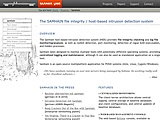 Samhain is a file integrity / intrusion detection system that can be used on single hosts as well as on networks. It been designed to monitor multiple hosts with potentially different operating systems, providing centralized logging and baseline database storage, although it can also be used as standalone application on a single host.
Samhain is a file integrity / intrusion detection system that can be used on single hosts as well as on networks. It been designed to monitor multiple hosts with potentially different operating systems, providing centralized logging and baseline database storage, although it can also be used as standalone application on a single host.
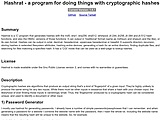 Hashrat is a command-line utility that hashes things using md5, sha1/256/512, whirlpool and jh hash algorithms. It's written in C with few dependancies (basically just the standard C library). It can read input from standard in and hash it, either as a complete file, or line-by-line. It can recursively hash files on disk, either outputing hashes to stdout, or storing them in filesystem attributes, or in a memcached server. It can check files against a list of hashes supplied on stdin, or in t
Hashrat is a command-line utility that hashes things using md5, sha1/256/512, whirlpool and jh hash algorithms. It's written in C with few dependancies (basically just the standard C library). It can read input from standard in and hash it, either as a complete file, or line-by-line. It can recursively hash files on disk, either outputing hashes to stdout, or storing them in filesystem attributes, or in a memcached server. It can check files against a list of hashes supplied on stdin, or in t
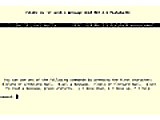 Elm Millennium Edition 2.5 (or Elm ME+ 2.5) is based on Elm 2.4 and incorporates some code from Elm 2.5. It contains enhanced MIME and character set support. A subset of UTF-8 (Unicode) is handled. It can read mail from a local mbox and POP or IMAP folders and can pass mail to the PGP or GPG programs. It can also view digests as a mailbox and reassemble fragmented (message/partial) messages. It includes modules for TLS/SSL, iconv, resolv, and SMTP.
Elm Millennium Edition 2.5 (or Elm ME+ 2.5) is based on Elm 2.4 and incorporates some code from Elm 2.5. It contains enhanced MIME and character set support. A subset of UTF-8 (Unicode) is handled. It can read mail from a local mbox and POP or IMAP folders and can pass mail to the PGP or GPG programs. It can also view digests as a mailbox and reassemble fragmented (message/partial) messages. It includes modules for TLS/SSL, iconv, resolv, and SMTP.
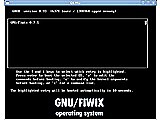 Fiwix is an operating system kernel written from scratch, based on the UNIX architecture and fully focused on being POSIX compatible. It is designed and developed mainly as a hobby OS and, since it serves also for educational purposes, the kernel code is kept as simple as possible for the benefit of readers or students. It runs on the i386 hardware platform and is compatible with a good base of existing GNU applications.
Fiwix is an operating system kernel written from scratch, based on the UNIX architecture and fully focused on being POSIX compatible. It is designed and developed mainly as a hobby OS and, since it serves also for educational purposes, the kernel code is kept as simple as possible for the benefit of readers or students. It runs on the i386 hardware platform and is compatible with a good base of existing GNU applications.
 liblo is an implementation of the Open Sound Control protocol for POSIX systems, started by Steve Harris and now maintained by Stephen Sinclair. It is released under the GNU Lesser General Public Licence version 2.1 or greater. This means that if it is included in closed-source systems, it must be dynamically linked such that the LibLO code remains freely modifiable.
liblo is an implementation of the Open Sound Control protocol for POSIX systems, started by Steve Harris and now maintained by Stephen Sinclair. It is released under the GNU Lesser General Public Licence version 2.1 or greater. This means that if it is included in closed-source systems, it must be dynamically linked such that the LibLO code remains freely modifiable.
 Gross is a greylisting server. The features that make gross stand out from other greylisters are: - it's blazingly fast - it's amazingly resource efficient - it can be configured to query DNSBL databases, and enforce greylisting only for hosts that are found on those databases - it can block hosts that match multiple DNSBL's - it can be replicated and run parallel on two servers - It supports Sun Java System Messaging Server, Postfix, Sendmail and Exim.
Gross is a greylisting server. The features that make gross stand out from other greylisters are: - it's blazingly fast - it's amazingly resource efficient - it can be configured to query DNSBL databases, and enforce greylisting only for hosts that are found on those databases - it can block hosts that match multiple DNSBL's - it can be replicated and run parallel on two servers - It supports Sun Java System Messaging Server, Postfix, Sendmail and Exim.
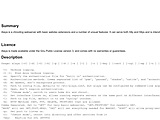 Alaya is a chrooting webserver with basic webdav extensions and a number of unsual features. It can serve both http and https and is intended to provide a simple means for people to share directories with webdav. Although it chroots it supports running CGI programs outside of the chroot via a trusted-path method. Alaya supports perfect-forward-secrecy and client certificate authentication.
Alaya is a chrooting webserver with basic webdav extensions and a number of unsual features. It can serve both http and https and is intended to provide a simple means for people to share directories with webdav. Although it chroots it supports running CGI programs outside of the chroot via a trusted-path method. Alaya supports perfect-forward-secrecy and client certificate authentication.
 Anweddol is a open-source client/server system providing temporary, SSH-controllable virtual machines to enhance anonymity online. It’s usefulness comes when someone wants to use a fully functional computer while being exposed to less dangers by using it remotely on a dedicated server, and by destroying it after use. The project includes the client and server implementation. Check out the website for more : https://the-anweddol-project.github.io/
Anweddol is a open-source client/server system providing temporary, SSH-controllable virtual machines to enhance anonymity online. It’s usefulness comes when someone wants to use a fully functional computer while being exposed to less dangers by using it remotely on a dedicated server, and by destroying it after use. The project includes the client and server implementation. Check out the website for more : https://the-anweddol-project.github.io/
 danectl - DNSSEC DANE implementation manager. What's DNSSEC? Secure DNS that you can trust. It has become really easy lately. What's DANE? Publishing your TLS keys as secure DNS records (TLSA SSHFP OPENPGPKEY SMIMEA) to prevent impersonation or man-in-the-middle attacks. It could eventually render certificate authorities unnecessary. Currently, it's mostly used for mail servers that want to stop anyone intercepting their incoming email. But the idea also applies to SSH host keys, and OpenPGP a
danectl - DNSSEC DANE implementation manager. What's DNSSEC? Secure DNS that you can trust. It has become really easy lately. What's DANE? Publishing your TLS keys as secure DNS records (TLSA SSHFP OPENPGPKEY SMIMEA) to prevent impersonation or man-in-the-middle attacks. It could eventually render certificate authorities unnecessary. Currently, it's mostly used for mail servers that want to stop anyone intercepting their incoming email. But the idea also applies to SSH host keys, and OpenPGP a
 Detroit is a POSIX platform abstraction layer for creating small and portable desktop applications. Detroit offers simple widgets, even more simpler menu system and extensible DSL language in its core.
Detroit is a POSIX platform abstraction layer for creating small and portable desktop applications. Detroit offers simple widgets, even more simpler menu system and extensible DSL language in its core.
 AVFS is a system, which enables all programs to look inside gzip, tar, zip, etc. files or view remote (ftp, http, dav, etc.) files, without recompiling the programs. AVFS can be used with FUSE to enable access to archives from any application. AVFS can also be used as a stand-alone shared library if FUSE is not available or unwanted.
AVFS is a system, which enables all programs to look inside gzip, tar, zip, etc. files or view remote (ftp, http, dav, etc.) files, without recompiling the programs. AVFS can be used with FUSE to enable access to archives from any application. AVFS can also be used as a stand-alone shared library if FUSE is not available or unwanted.
 A console RSS/Atom feed reader.
A console RSS/Atom feed reader.
 "fgallery" is a static photo gallery generator with no frills that has a stylish, minimalist look. "fgallery" shows your photos, and nothing else. There is no server-side processing, only static generation. The resulting gallery can be uploaded anywhere without additional requirements and works with any modern browser.
"fgallery" is a static photo gallery generator with no frills that has a stylish, minimalist look. "fgallery" shows your photos, and nothing else. There is no server-side processing, only static generation. The resulting gallery can be uploaded anywhere without additional requirements and works with any modern browser.
 Replacement for old libnss-mysql as naming service library in Linux. You can store user information in MariaDB/MySQL database. E.g. `ls` then automatically shows user name from the database, `getent` shows users and groups. ## Features - implements `password`, `shadow` and `group` getters - `cmake` build system - `libconfig` for configuration - uses direct queries and `real_escape_string` - uses `threads.c` from `C11` - requirements: `Glibc 2.28`, `GCC 8`, equivalent of `Debian 10` (*Buster*)
Replacement for old libnss-mysql as naming service library in Linux. You can store user information in MariaDB/MySQL database. E.g. `ls` then automatically shows user name from the database, `getent` shows users and groups. ## Features - implements `password`, `shadow` and `group` getters - `cmake` build system - `libconfig` for configuration - uses direct queries and `real_escape_string` - uses `threads.c` from `C11` - requirements: `Glibc 2.28`, `GCC 8`, equivalent of `Debian 10` (*Buster*)
 NetSurf is a free, open source web browser. It is written in C and released under the GNU Public Licence version 2. NetSurf has its own layout and rendering engine entirely written from scratch. It is small and capable of handling many of the web standards in use today.
NetSurf is a free, open source web browser. It is written in C and released under the GNU Public Licence version 2. NetSurf has its own layout and rendering engine entirely written from scratch. It is small and capable of handling many of the web standards in use today.
 Druwez is a GTK based graphical printing tool written in Python. With Druwez you can use drag & drop or the clipboard to print multiple files at once from the file manager without opening any dedicated applications. You can optionally save print jobs to print them later (again). Only the file names but not the file content are saved in that case so you don’t need much disk space. Druwez itself can handle PDF, PNG, JPEG and SVG files. To print other file formats you can define converters. A co
Druwez is a GTK based graphical printing tool written in Python. With Druwez you can use drag & drop or the clipboard to print multiple files at once from the file manager without opening any dedicated applications. You can optionally save print jobs to print them later (again). Only the file names but not the file content are saved in that case so you don’t need much disk space. Druwez itself can handle PDF, PNG, JPEG and SVG files. To print other file formats you can define converters. A co
 Dasynq is an event loop library similar to libevent, libev and libuv. Key features/attributes are: written in portable C++ code (C++11); Thread safe — full support for use in a multi-threaded application; Header-only library — does not install a shared library; Supports file I/O, signals, process termination and timer events; Linux, OpenBSD, FreeBSD, MacOS — and portable to others. Like other such libraries, it is crossplatform / portable. Unlike most other such libraries, it is intended to be
Dasynq is an event loop library similar to libevent, libev and libuv. Key features/attributes are: written in portable C++ code (C++11); Thread safe — full support for use in a multi-threaded application; Header-only library — does not install a shared library; Supports file I/O, signals, process termination and timer events; Linux, OpenBSD, FreeBSD, MacOS — and portable to others. Like other such libraries, it is crossplatform / portable. Unlike most other such libraries, it is intended to be
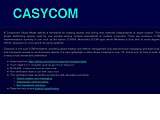 An asynchronous component object framework, allowing creation and calling of objects distributed across processes or computers.
An asynchronous component object framework, allowing creation and calling of objects distributed across processes or computers.
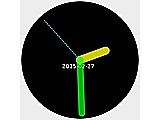 Graphical User Interfaces, The UNIX Way -- Pipeglade is a helper program that displays graphical user interfaces for other programs. It renders the GUI definition found in a GtkBuilder file (created using the Glade Interface Designer), and communicates with the main program solely via pipes or fifos. To have its GUI rendered by pipeglade, a program must be able to send plain text commands to standard output or a named pipe and/or receive and parse simple plain text messages from standard inpu
Graphical User Interfaces, The UNIX Way -- Pipeglade is a helper program that displays graphical user interfaces for other programs. It renders the GUI definition found in a GtkBuilder file (created using the Glade Interface Designer), and communicates with the main program solely via pipes or fifos. To have its GUI rendered by pipeglade, a program must be able to send plain text commands to standard output or a named pipe and/or receive and parse simple plain text messages from standard inpu
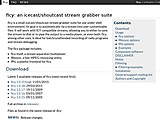 fIcy is a small icecast/shoutcast stream grabber suite for use under shell environment. Its goal is to automatically rip a stream into user customisable files. It will work with ICY compatible streams, allowing you to either to save the stream to disk or to pipe the output to a media player, or even both. fIcy, among other uses, is ideal for batch/unattended recording of radio programs and stream debugging.
fIcy is a small icecast/shoutcast stream grabber suite for use under shell environment. Its goal is to automatically rip a stream into user customisable files. It will work with ICY compatible streams, allowing you to either to save the stream to disk or to pipe the output to a media player, or even both. fIcy, among other uses, is ideal for batch/unattended recording of radio programs and stream debugging.
 XODA is a KISSed (Keep Simple and Stupid) System for Organizing Documents using AJAX. This is a Document Management System without backend database, though making possible organizing files/directories by descriptions, filters and more.
XODA is a KISSed (Keep Simple and Stupid) System for Organizing Documents using AJAX. This is a Document Management System without backend database, though making possible organizing files/directories by descriptions, filters and more.
 By window managers and by desktop environments is irritation solicited? Is a gigabyte sized graphical user interface software tool kit an unreasonable requirement? Then xlaunch can cure those blues. First a grab key or key combination is pressed. Next a launch key or key combination is pressed. Then a program launches. An example follows. By the home as an activation key a web browser, such as firefox, can be launched. That makes sense since a home page is displayed. Upon xlaunch start any
By window managers and by desktop environments is irritation solicited? Is a gigabyte sized graphical user interface software tool kit an unreasonable requirement? Then xlaunch can cure those blues. First a grab key or key combination is pressed. Next a launch key or key combination is pressed. Then a program launches. An example follows. By the home as an activation key a web browser, such as firefox, can be launched. That makes sense since a home page is displayed. Upon xlaunch start any
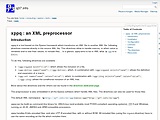 xppq is a command-line tool which transforms an XML file to another XML file, following directives inserted directly in the source XML file. This directives allow to handle macros, to affect value to variables and to test their values, to include files… In a glance, xppq aims to be to XML what cpp is to C/C++. It is developed in C++, and uses only system and C/C++ standard libraries, so it doesn't need third party components. It can run on GNU/Linux (and probably most POSIX-compliant operating s
xppq is a command-line tool which transforms an XML file to another XML file, following directives inserted directly in the source XML file. This directives allow to handle macros, to affect value to variables and to test their values, to include files… In a glance, xppq aims to be to XML what cpp is to C/C++. It is developed in C++, and uses only system and C/C++ standard libraries, so it doesn't need third party components. It can run on GNU/Linux (and probably most POSIX-compliant operating s
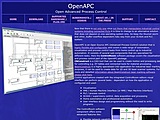 OpenAPC is an APC (Advanced Process Control) solution that is highly flexible and configurable and covers a wide range of automation, visualization, and process control tasks from home control up to industrial automation and manufacturing. The software package is available for many different platforms, so OpenAPC projects can be switched over to a different platform easily. OpenAPC software package consists of ControlRoom (a visualisation and process controlling software consisting of editor, de
OpenAPC is an APC (Advanced Process Control) solution that is highly flexible and configurable and covers a wide range of automation, visualization, and process control tasks from home control up to industrial automation and manufacturing. The software package is available for many different platforms, so OpenAPC projects can be switched over to a different platform easily. OpenAPC software package consists of ControlRoom (a visualisation and process controlling software consisting of editor, de
 Runner is a launch menu for X Window System. It is meant to start fast and give access to often used programs but also run any command. It's also optimized for keyboard usage.
Runner is a launch menu for X Window System. It is meant to start fast and give access to often used programs but also run any command. It's also optimized for keyboard usage.
 Elm 2.4ME+ is based on Elm 2.4. It contains enhanced MIME and character set support. It can read mail from a local mbox and POP or IMAP folders and can pass mail to the PGP or GPG programs. It can also view digests as a mailbox and reassemble fragmented (message/partial) messages. It includes modules for TLS/SSL, iconv, and SMTP.
Elm 2.4ME+ is based on Elm 2.4. It contains enhanced MIME and character set support. It can read mail from a local mbox and POP or IMAP folders and can pass mail to the PGP or GPG programs. It can also view digests as a mailbox and reassemble fragmented (message/partial) messages. It includes modules for TLS/SSL, iconv, and SMTP.
 sup is a very small and secure C application. it is designed to run as root (with suid bit on) to facilitate the privilege escalation of users to execute certain programs as superuser. all settings in sup are hard-coded at compile time. sup is very portable and self-contained, designed for production use as a static binary. sup is a sort of hard-coded sudo: it is an ideal companion for artisans building small containers and embedded systems.
sup is a very small and secure C application. it is designed to run as root (with suid bit on) to facilitate the privilege escalation of users to execute certain programs as superuser. all settings in sup are hard-coded at compile time. sup is very portable and self-contained, designed for production use as a static binary. sup is a sort of hard-coded sudo: it is an ideal companion for artisans building small containers and embedded systems.
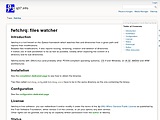 fwtchrq is a command-line tool, based on the Epeios framework, which watches files and directories from a given path and reports their modifications. Besides files modifications, it also reports moving, renaming, creation and deletion of directories. It's written in C++ and makes use of task parallelism to be as fast as possible, notably when exploring the content of a directory and its sub-directories. It uses only system and C/C++ standard libraries, so it doesn't need third party components.
fwtchrq is a command-line tool, based on the Epeios framework, which watches files and directories from a given path and reports their modifications. Besides files modifications, it also reports moving, renaming, creation and deletion of directories. It's written in C++ and makes use of task parallelism to be as fast as possible, notably when exploring the content of a directory and its sub-directories. It uses only system and C/C++ standard libraries, so it doesn't need third party components.
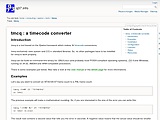 tmcq is a command-line tool which makes timecode conversions. It is developed in C++, and uses only system and C/C++ standard libraries, so it doesn't need third party components. It can run on GNU/Linux (and probably most POSIX-compliant operating systems), OS X and Windows, natively on IA-32, AMD64 and ARM architectures.
tmcq is a command-line tool which makes timecode conversions. It is developed in C++, and uses only system and C/C++ standard libraries, so it doesn't need third party components. It can run on GNU/Linux (and probably most POSIX-compliant operating systems), OS X and Windows, natively on IA-32, AMD64 and ARM architectures.
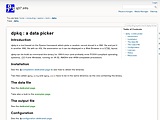 dpkq is a command-line tool which picks a random record stored in a XML file and put it in another XML file with an XSL file association so it can be displayed in a web browser in a HTML layout. It is developed in C++, and uses only system and C/C++ standard libraries, so it doesn't need third party components. It can run on GNU/Linux (and probably most POSIX-compliant operating systems), OS X and Windows, natively on IA-32, AMD64 and ARM architectures.
dpkq is a command-line tool which picks a random record stored in a XML file and put it in another XML file with an XSL file association so it can be displayed in a web browser in a HTML layout. It is developed in C++, and uses only system and C/C++ standard libraries, so it doesn't need third party components. It can run on GNU/Linux (and probably most POSIX-compliant operating systems), OS X and Windows, natively on IA-32, AMD64 and ARM architectures.
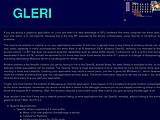 A service and API for using OpenGL through a socket.
A service and API for using OpenGL through a socket.
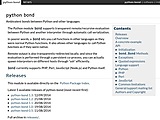 The Python module bond supports transparent remote/recursive evaluation between Python and another interpreter through automatic call serialization. In poorer words, a bond lets you call functions in other languages as they were normal Python functions. It also allows other languages to call Python functions as if they were native. Remote output is also transparently redirected locally, and since the evaluation is performed through a persistent co-process, you can actually spawn interpreters o
The Python module bond supports transparent remote/recursive evaluation between Python and another interpreter through automatic call serialization. In poorer words, a bond lets you call functions in other languages as they were normal Python functions. It also allows other languages to call Python functions as if they were native. Remote output is also transparently redirected locally, and since the evaluation is performed through a persistent co-process, you can actually spawn interpreters o
 ppip is a reimplementation of the venerable CP/M utility PIP - Peripheral Interchange Program
ppip is a reimplementation of the venerable CP/M utility PIP - Peripheral Interchange Program
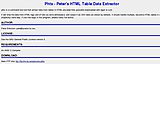 A small Unix command line tool that can be used to extract data from tables in a HTML-encoded text file. Outputs the (stripped from other HTML tags and (possible whitespace) data as a CSV-formatted file/on stdout. Should handle recursive tables and the most common incorrect HTML errors (missing
A small Unix command line tool that can be used to extract data from tables in a HTML-encoded text file. Outputs the (stripped from other HTML tags and (possible whitespace) data as a CSV-formatted file/on stdout. Should handle recursive tables and the most common incorrect HTML errors (missing | , or
tags.